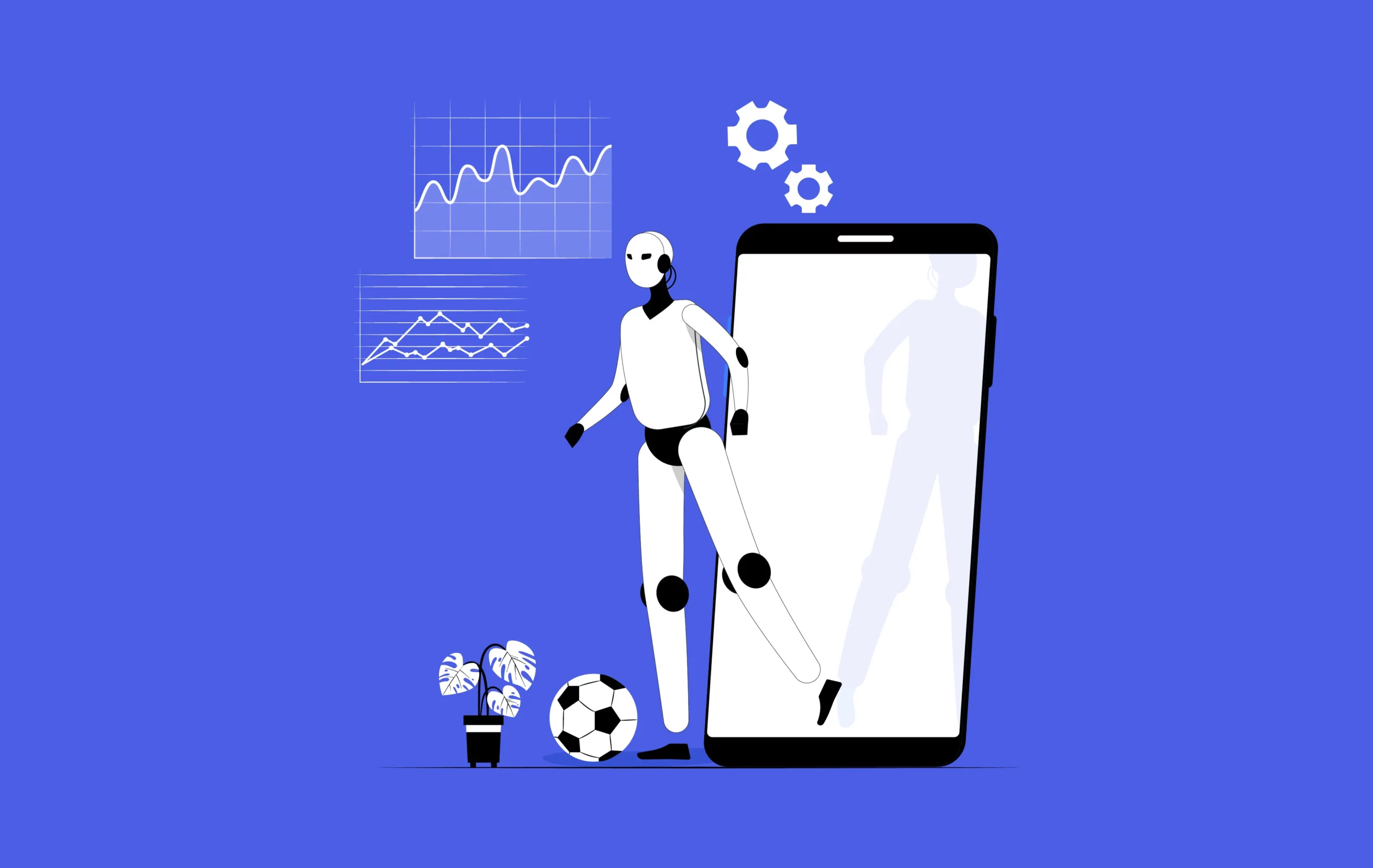- AI in Sports and Gaming: Key Statistics
- Talent Identification and Acquisition
- Game Analytics
- Training and Coaching
- Predictive Modeling
- Strategy Improvement
- Injury Prevention
- Fan Engagement
- Immersive Experiences
- AI Integration in Sports & Gaming
- Performance Enhancement for Athletes
- Game Analytics and Decision-Making
- Fan Engagement and Experience
- Operations and Management
- Broadcasting and Media
- Implementation Steps for Integrating AI into Sports
- Applications of AI in Sports Business
- 1. Player Performance
- 2. Personalized Training and Diet Plans
- 3. Scouting and Recruitment
- 4. Ticketing
- 5. Sports Predictions
- 6. Automated Sports Journalism
- 7. Advertising
- 8. Decipher Game Footage and Detect Subtle Patterns
- 9. Sports Equipment Innovation
- Future of Artificial Intelligence in Sports Industry: What to Expect
- Sports App Development Simplified: How Appinventiv Can Help You Thrive
- FAQs
As we are moving toward a technology-rich future, we see the world of sports evolving by leaps. While statistical data has always played a central role in the sports industry, one technology has significantly increased the level of audience engagement and strategic gaming. We are talking about the advent of artificial intelligence in sports industry.
Over the past two decades, artificial intelligence has completely transformed how we engage and analyze sports. AI/ML in sports is making the world smarter for athletes, broadcasters, advertisers, and at last, the viewers who can get real-time statistics.
Furthermore, the pivotal role of artificial intelligence in sports forecasting, which facilitates an informed decision-making process, is one of the top benefits of AI in sports.
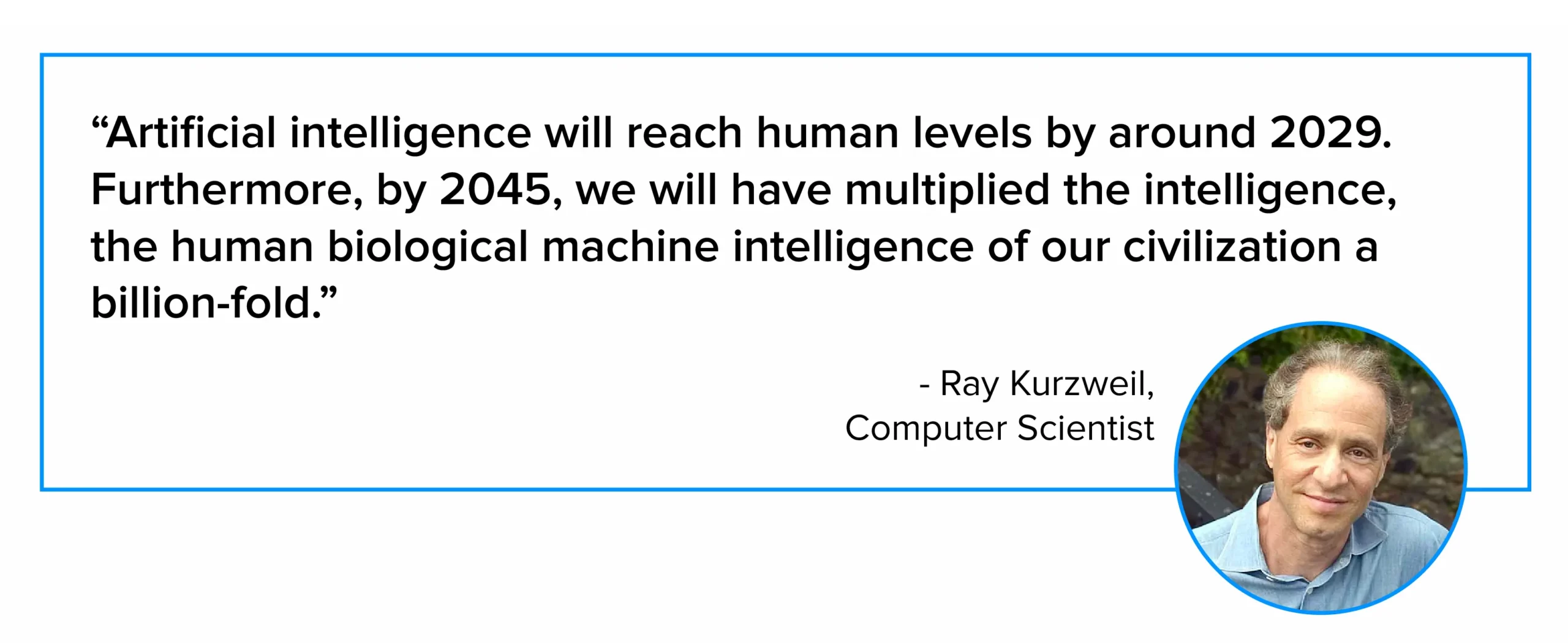
The applications of AI in the sports industry have become a common sight, even though not many experts talk about it. However, we don’t limit the potential of AI when integrated into businesses and enterprises. Considering the positive impact and precision this technology brings to the ground, there’s no doubt that AI sports solutions will flourish immensely in the future.
This blog talks about the transformation AI brings to the sports industry, the uses, and applications of artificial intelligence in the sports industry, and the future of AI technology in the sports business. So sit through; it’s going to be an exciting ride.
AI in Sports and Gaming: Key Statistics
The market for artificial intelligence in the sports industry has experienced significant growth in recent years. This growth can be attributed to advancements in AI technologies, increased investments from sports organizations, and a growing demand for data-driven insights. For instance, the global sports analytics market is projected to reach a valuation of $22 billion by 2030.

Also, the global artificial intelligence sports market is forecasted to reach $19.9 billion by the year 2030.This points out that the use of AI in sports industry and its global market has expanded and is projected to continue growing as more sports teams, leagues, and technology providers adopt AI solutions for sports.
Other factors influencing the market growth are increased demand for player monitoring and tracking, real-time sports data analytics, AI for sports betting, and AI sports predictions. Also, there is a growing demand for virtual assistants and chatbots to interact with fans and sports enthusiasts.
Another study suggests that mobile applications such as HomeCourt, ESPN, AI SmartCoach, etc., are used to assess players’ skills, giving them a good medium to improve.
The above data proves how AI influences the sports industry to be data and information-rich. Not just popular sports but certain sports enterprises rely entirely on AI and machine learning to drive their business. If you are one of them, you might want to know how before we jump to its use cases. Let’s take a quick glance at how AI for sports is revolutionizing the industry. 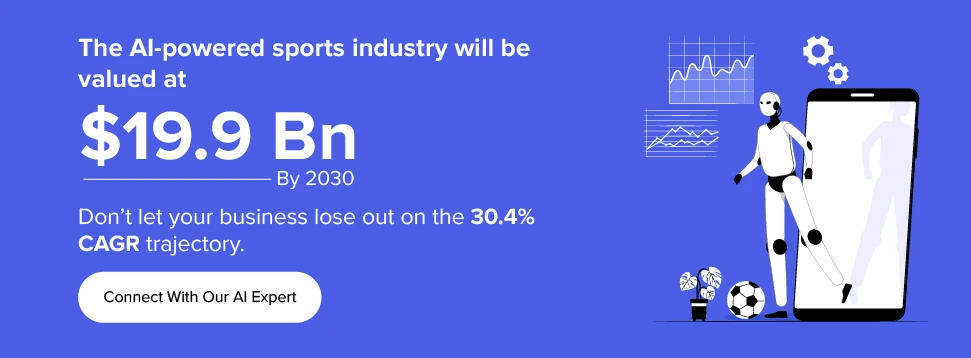
Introduction to Artificial Intelligence Framework for Sports
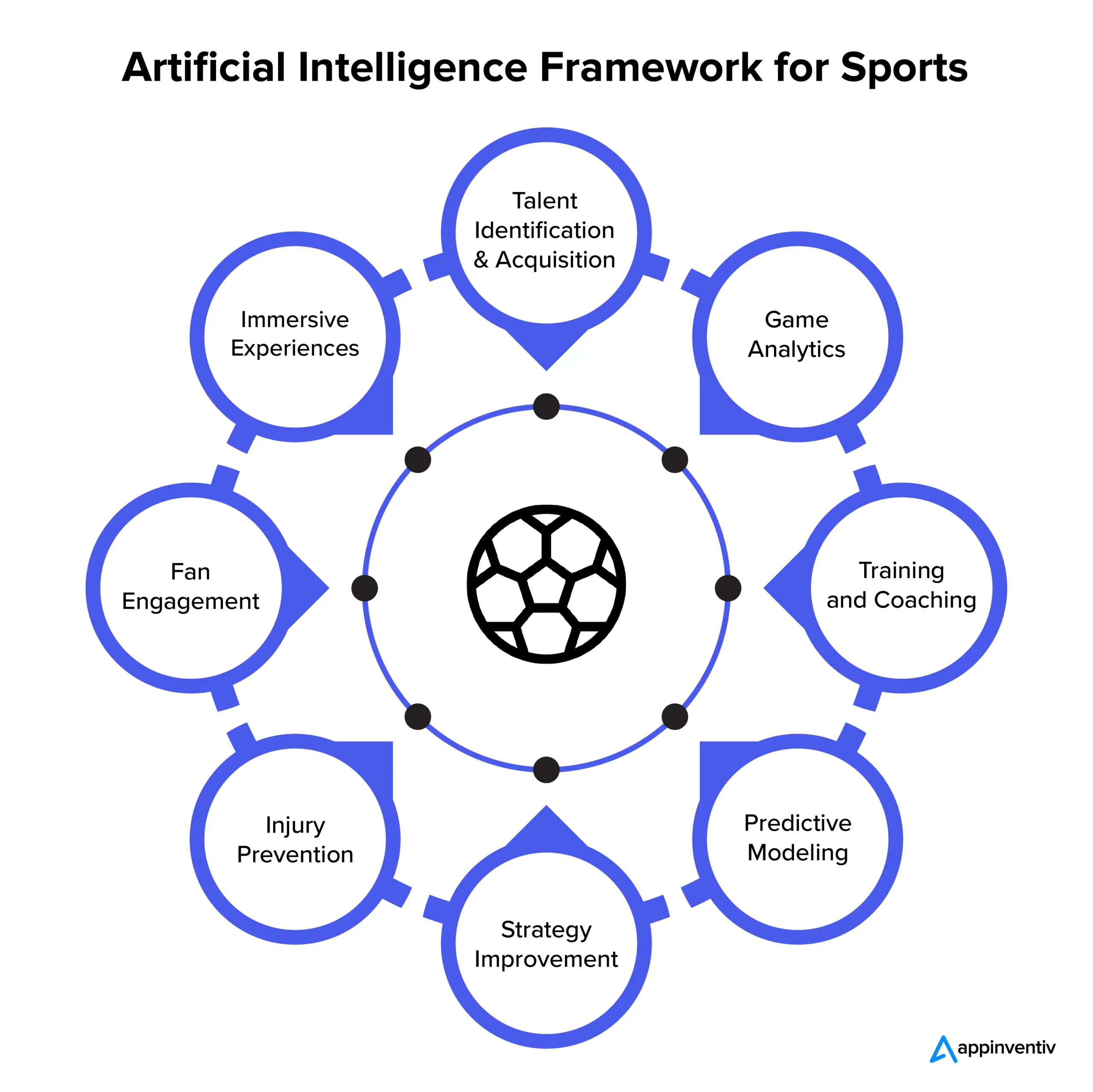
Artificial Intelligence is an umbrella term covering a variety of what we refer to as “smart” technologies. Artificial intelligence is constantly revolutionizing thousands of businesses by analyzing data for insights, automating tasks, optimizing operations, and enhancing customer experience.
With its predictive capabilities, AI helps businesses make informed decisions and drive innovation and efficiency across diverse industries.
An artificial intelligence framework for sports incorporates data collection and analysis. To improve strategy and training, it makes use of real-time player tracking, performance statistics, and predictive modeling. This framework transforms the field of sports and performance improvement by leveraging AI algorithms for injury prevention, fan engagement, and immersive experiences.
The primary objective of artificial intelligence in the sports industry is to make competitions more fierce on and off the field. There are certain areas where AI and machine learning have left a solid footprint in the world of sports. Let’s see the top AI uses:
Talent Identification and Acquisition
Talent identification and acquisition is a multifaceted process encompassing various aspects such as biomechanics, player performance measurement, and player recruitment. Biomechanics plays a crucial role in assessing athletes’ physical capabilities and movement patterns, helping to identify potential talent.
Using IoT in sports assists in player performance measurement, which involves systematically evaluating players’ skills, abilities, and overall performance to gauge their suitability for recruitment.
Game Analytics
Game analytics encompasses a variety of components that contribute to the overall understanding and analysis of sports events. One aspect of AI in sports analytics is umpire assistance, which involves using technology to aid umpires in making accurate decisions during matches. One of the best examples of this is ball tracking systems which monitor the movement and trajectory of the ball in real-time.
Another component is the analysis of match events, which involves examining various aspects of the game, such as goals, fouls, and substitutions, to gain insights into team performance and strategies. AI algorithms can analyze vast amounts of data to make predictions and provide insights for sports betting purposes.
Overall, game analytics is a comprehensive approach to understanding and analyzing sports events, utilizing various technologies and methodologies to gain valuable insights.
Training and Coaching
Training and coaching in the realm of sports includes a wide range of responsibilities. It encompasses tactical planning, which involves devising strategies and game plans to maximize the team’s chances of success.
Additionally, player injury modeling is crucial to training and coaching, as it helps identify potential risks and implement preventive measures. Team formation assessment is another important task, as it involves evaluating the strengths and weaknesses of individual players to create a cohesive and balanced team. These various training and coaching aspects contribute to a sports team’s overall development and success.
Predictive Modeling
AI computers predict outcomes via predictive modeling. By taking into account biometrics, external factors, and historical data, these models can forecast player injuries, assisting in the development of injury prevention techniques. They also simulate game scenarios, which helps with strategic planning.
Strategy Improvement
AI-powered analysis now includes an opponent perspective. Teams can create more successful game plans by analyzing opponent data to identify patterns and tendencies. AI systems recommend the best lineup combinations during games and make real-time tactical adjustments.
Injury Prevention
Real-time player biometric monitoring is a crucial component in AI-powered fitness and sports apps. This makes identifying indicators of exhaustion, stress, or harm risk possible. Coaches and medical personnel are notified, which enables prompt interventions and eventually lowers the risk of injury.
Fan Engagement
AI-driven analytics are revolutionizing fan engagement. It is possible to tailor content, promotions, and interactions by understanding fan preferences and habits. This specific strategy improves fan interactions, encouraging engagement and loyalty.
Immersive Experiences
Through creative camera angles and augmented reality overlays, AI-enhanced broadcasts give viewers a better experience. Virtual reality and gamified features create immersive and dynamic experiences for fans looking for a deeper level of engagement.
Also read- Applications of Metaverse in Virtual Gaming
The field of AI, particularly machine learning, has proven to be beneficial for all the sports challenges mentioned above. To talk about them in detail, here is a range of artificial intelligence use cases in sports.
AI Integration in Sports & Gaming
Artificial Intelligence (AI) is transforming the world of sports, from how to play, manage, and experience games. From developing athletic performance to creating highly interactive fan experiences, AI has become an essential tool for sports stakeholders.
The driving force is advancements in machine learning, computer vision, predictive analytics, and natural language processing, allowing real-time insights and automation.
Performance Enhancement for Athletes
Data-based methods in athlete training and performance:
Training Analytics: Real-time tracking through AI-enabled wearables with heart rate, stamina, and stress level metrics. Such wearables make way for customized training programs and point to where one’s performance is being improved.
Preventive Injury: Using biomechanics and movement pattern analysis, AI can pick up early warnings of potential injuries and help design rehabilitation programs specific to each athlete’s recovery needs.
Game Strategy Optimization: AI analyzes opponents’ data to craft strategic plans, providing competitive advantages.
Game Analytics and Decision-Making
AI elevates the capabilities of coaching and decision-making through automated analytical processes:
Video Analysis: AI processes video footage, extracting pivotal moments in the game, such as a goal or foul, and delivering actionable insights.
Real-Time Decision Support: AI offers live-game tactical recommendations to help improve decision-making.
Fan Engagement and Experience
AI empowers fans through personalized, engaging solutions.
Customized content: It is provided as recommendation engines would suggest videos, articles, or merchandise.
Chatbots and Virtual Assistants: AI-powered bots answer fan questions and help them with ticketing and event information.
AR/VR Integration: AI animates virtual stadium tours and interactions with players.
Operations and Management
AI helps in managing sports more efficiently by performing complex tasks through automation.
Scheduling and Resource Planning: AI schedules events effectively and manages resources.
Ticketing and Revenue Management: Dynamic pricing models have maximized revenue without compromising affordability.
Security and Crowd Management: AI monitoring of crowd behavior to ensure safety.
Broadcasting and Media
AI enhances broadcasting through automation solutions:
Automated Commentary: AI gives real-time insights into the game during broadcast.
Highlight Creation: AI tools automatically create and circulate the game highlights.
Implementation Steps for Integrating AI into Sports
Artificial Intelligence integration within the realm of sports transforms and revolutionizes the process, and way of action of the teams, the sports, and the organizations themselves. Thus, sports experts by taking advantage of AI achieve excellent insights into bettering the performance of individuals while developing a greater appeal of a fan and optimum ways of making decisions.
The following roadmaps involve the integration steps during the scaling solution phase:
Identify Objectives: Clearly write down your goals, maybe to boost the performance of players, engage fans effectively, or optimize strategies
Collect data: Collect from wearables, video analytics, or historical performance data
Tools selection: Based on objective selection, proper AI tools may be motion tracking systems, predictive analytics platforms, or visualization tools.
Build a model: Create custom custom-designed AI model for specific objectivities that can predict or analyze for injury or to analyze a game.
Test and Optimize: Pilot test AI solutions to gauge their effectiveness, making adjustments for accuracy and reliability.
Scale and Integrate: Gradually roll out AI solutions across the organization, integrating them into workflows while refining them over time.
Applications of AI in Sports Business
The sports business is at a point where it is ready to adopt every AI strategy and improve its decision-making by performing data-driven objectives. As a matter of fact, from 2015 to 2018, the NBA reviewed over 25,000 games and found over 2,000 missed or incorrect actions. This amounts to 1.49% wrong decisions in the finals of each close game.
This deciding factor has now been rescued by AI-dependent technologies where the officials can watch every close game with probability and visual data. Not only that, AI-based technologies serve the sports industry in a thousand other scenarios.

Below are a few of the significant AI in sports examples that will give you in-depth understanding of how is AI used in sports:
1. Player Performance
Thanks to predictive analytics, AI in sports is used to boost performance and health. With the help of wearable technology, athletes can gather information on strain and tear levels and can further avoid serious injuries. This also helps the team shape strong tactics and strategies and maximize their strength.
AI is also used for analyzing players’ performance. Even the coaches can gain insights using visuals and data to work on the strength and weaknesses of the players and make alterations in the game strategies.
From football to tennis, AI can be harnessed in all types of sports. A powerful AI technology, computer vision is used for human motion sensing and tracking using video sequences. This brings out three results:
- Motion tracking and detection
- Color tracking
- Color and template combination tracking
One popular use of AI in sports industry is determining the swimmer’s performance below water filters using human pose estimation. This method takes over the ancient quantitative evaluation method by manually annotating the swimmer’s body.
2. Personalized Training and Diet Plans
The advent of AI/ML in sports has taken the personal training of sportspersons and athletes to the next level. An AI diet plan uses machine learning to customize different meal plans for different players based on their needs and schedule. And that’s just the beginning.
Not to forget about the featured AI-based fitness apps that have flooded the market. These tools and techniques can now train algorithms to detect human poses in real-time.
One popular example is women’s fitness app development, where keypoint skeleton models are used to identify human joints for online yoga and pilates.
3. Scouting and Recruitment
Sports teams are making competitions more rigid and fierce by adding artificial intelligence to the scouting and recruitment box of tricks. Everything that takes place on the field, from the player’s movements to the orientation of their body, is tracked to make the right decision.
Further, machine learning algorithms are put to aggregate data and evaluate players’ skills and overall potential in various game categories.
Not only the recruitment choices are improved this way, but countries also get a strong and healthy team to achieve the impossible.
4. Ticketing
Often, the audience struggles to get inside stadiums on time for the match at big sporting events. Nothing could resolve the crowd issue until AI solutions for sports emerged.
For instance, sports businesses are now leveraging AI-based face recognition technology that allows fans to enter the stadium without having to check their tickets. This prevents bottlenecks and makes the stadium entryway more efficient.
Apart from this, predictive and cognitive analytics is used to forecast what attendance is likely to be at the stadium along with the timing schedule. This helps the officials to keep up with the demand without much effort. Moreover, the merchandise and food arrangements are on time.
(Also read: How Much Does It Cost to Build a Sports Betting App Like Sportsbet in Australia)
5. Sports Predictions
It has long been clear that officials use large data to forecast outcomes. However, when relying on probabilistic insights, making forecasts only based on first-half performance or statistics like aces and scores is merely a semblance of predicting.
Even while artificial intelligence in sports cannot guarantee exact results, its algorithms greatly improve upon human predictions.
Over 40% of the sports categories can now predict match outcomes using AI based on the below factors:
- A team’s formation
- Number of goals scored
- Key passes for goal-scoring opportunity
- A team’s formation
- The number of passes between teammates etc.
AI analytic tools can analyze the closest match prediction scores possible using the above data.
6. Automated Sports Journalism
Sports journalism is a big business where each and every highlight, like score data and statistics, needs to be meticulously covered. Thanks to AI that has simplified the techniques of sports journalism.
For example, AI-driven platforms can convert score data into narratives using NLP. The platforms are based on automated insights that sync intelligently with computer vision and perform the journal score hearing.
This is a fascinating take on AI sports, where the local matches can easily be covered without the officials standing on the field.
7. Advertising
This is a short and underrated benefit of AI in sports. Artificial Intelligence can be used to identify opportunities and present more relevant ads based on demographics. Brands, in this way, get better advertising based on top highlights of the game identified by AI.
The cherry on the cake is the automated learning algorithms of AI and machine learning in sports that monitor players’ actions and audiences’ emotions during matches.
Isn’t it fascinating how artificial intelligence in the sports industry has redefined the concept of watching and playing games most efficiently? If you ask about the future of AI in the sports business, we’d say it’s bright and shining. AI is everywhere, and there’s no going back from the robust AI-powered sports applications now. So, it is the right time to invest in the AI sports industry.
8. Decipher Game Footage and Detect Subtle Patterns
AI helps coaches and analysts break down game footage, identifying hidden patterns and insights that may go unnoticed by the human eye. From player positioning to opponent strategies, sports AI analytics provide deeper understanding, enabling teams to fine-tune tactics and improve performance.
9. Sports Equipment Innovation
AI is revolutionizing sports equipment by optimizing design and materials for enhanced performance and safety. Whether it is creating smarter helmets or more aerodynamic shoes, sports AI innovations ensure athletes perform at their best while reducing the risk of injury.
Future of Artificial Intelligence in Sports Industry: What to Expect
AI has already increased competitiveness by a huge margin. With effective sensors and algorithms, AI has all in hand for game strategists, sports companies, advertisers, franchise owners, and spectators. With such a broad scope of implementations, businesses are likely to invest in AI development services for sports application development. This convergence of sports and AI is redefining industry standards and driving innovation across the sector.
Therefore, make sure you are not too late to invest in AI sports app development.
Sports App Development Simplified: How Appinventiv Can Help You Thrive
Appinventiv is a leading AI services powerhouse crafting ingenious generative AI solutions for the sports industry helping businesses streamline tasks, conquer challenges and enrich user interactions.
Our expert team simplifies the sports app development process, guiding you right from the ideation to the execution stage. As a dedicated IT consulting firm, we ensure your app succeeds by developing user-friendly solutions catering to the dynamic sports landscape. Whether it’s about implementing interactive features, providing real-time updates, or offering a seamless user experience, we have got you covered.
Throughout the span of 8 years, we have consistently delivered top-notch AI-based solutions to global brands like Vyrb, YouComm, JobGet, Adidas, IKEA, and others, increasing their user base and helping them generate huge RoI.
Elevate your business with premium AI-driven solutions with an artificial intelligence services company like ours and uncover new growth opportunities of AI in sports. Talk to our AI/ML experts today.
FAQs
Q. What is AI in sports?
A. AI in sports refers to the application of technology to several facets of the sports sector. This involves transforming the sports environment by enhancing player performance analysis, injury prevention, strategy planning, fan engagement, and operational efficiency through the use of machine learning, data analysis, and predictive modeling.
Q. How is AI used in sports?
A. Here are some of the key roles of AI/ML in the sports industry:
- Real-time tracking
- Player performance analysis
- Injury prediction
- Opponent analysis
- Tactical insights
- Fan engagement
- Predictive modeling
- Virtual reality experiences
- Operational optimization
Q. What is an example of AI in sports?
A. Here are some of the top AI in sports examples:
Analysis of Player Performance: AI algorithms examine player performance information, such as gait patterns, speed, and endurance. Coaches and analysts can use this information to pinpoint players’ strengths, flaws, and potential improvement areas.
Game Strategy Optimization: AI models analyze the playing styles of the opposition and make recommendations for the best approaches using statistical knowledge. This helps managers make tactical choices throughout games.
Referee Decisions: AI is utilized to watch and analyze game footage, which helps referees make decisions that are fair and accurate in real-time.
Player Biometrics: Wearable technology with AI collects in-game biometric information in real-time to help players improve their performance and recovery.
Gameplay Testing: AI simulations let game designers test different situations, balance improvements, and rule modifications in sports video games.
These applications demonstrate how AI may be used in a variety of ways to improve many facets of sports and gaming.
Q. What is the future of AI in sports?
A. The future of Artificial Intelligence in sports industry is poised to bring about significant transformations. With AI, teams will gain enhanced player insights, allowing for more informed decision-making and strategic planning. Additionally, AI can play a crucial role in injury prevention, helping athletes stay in optimal condition.
Moreover, the use of AI will revolutionize fan experiences, offering personalized engagement and immersive virtual reality interactions. Data-driven decisions will become the norm as teams leverage AI to optimize performance and gain a competitive edge.
Overall, the continued evolution of AI in sports will have far-reaching implications, reshaping the landscape of sports on multiple fronts.


- In just 2 mins you will get a response
- Your idea is 100% protected by our Non Disclosure Agreement.
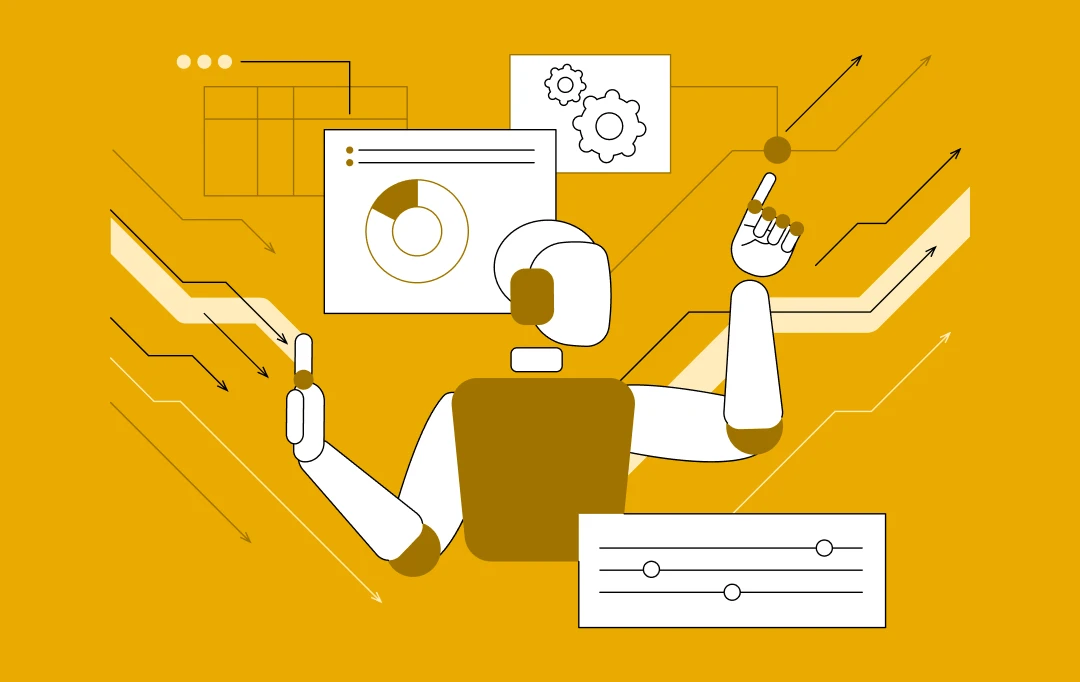
How to Integrate AI with EHR/EMR Systems for Streamlined Healthcare Operations
Key takeaways: Not adopting AI in EHR/EMR today risks falling behind. AI streamlines EHR workflows, cutting clinical and admin delays. Real-world hospitals are already seeing faster, smarter care with AI. Seamless AI integration needs system checks, data prep, and training. AI in EHR tackles real challenges like bias, cost, and compliance. Custom AI integration costs…
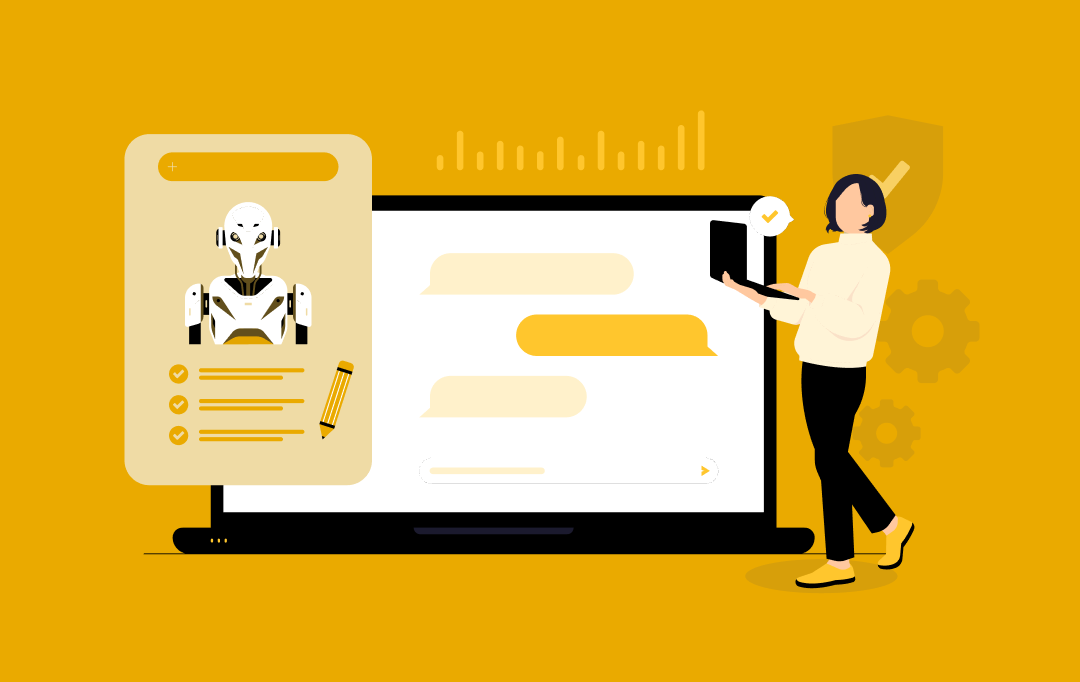
AI Agent-Driven UIs: Replacing App Menus and Buttons
Key takeaways: Challenge: Static menus and buttons also become outdated because people are frustrated by limited, multi-stage navigation. Solution: The AI Agent interacts with the user through a friendly UI that does not require cludgy menus but conversational and context-sensitive navigation. The Way AI Agents Work: AI agents establish a basis of natural language understanding,…
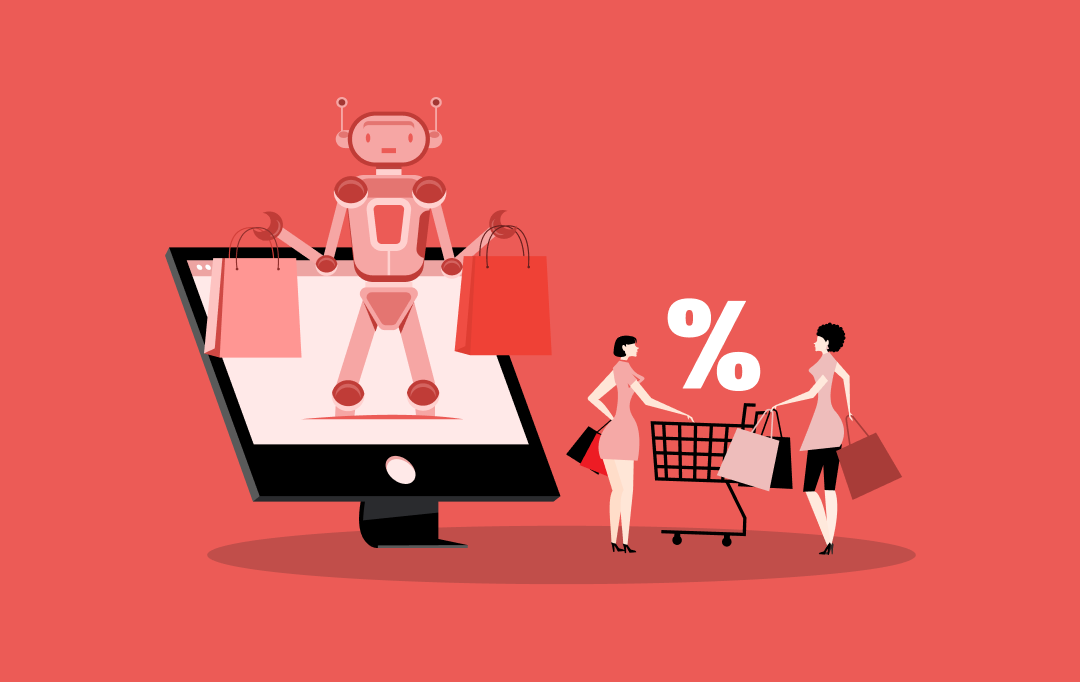
10 Use Cases and Benefits of How AI Agents Are Revolutionizing the Retail Industry
Key takeaways: AI agents in the retail industry are revolutionizing businesses by enhancing customer experience and streamlining operations. From personalized recommendations to predictive analytics, AI offers tangible benefits like increased conversions and reduced costs. AI adoption can lead to scalable growth and a competitive edge in the retail industry. Retailers must consider data strategies, talent…






